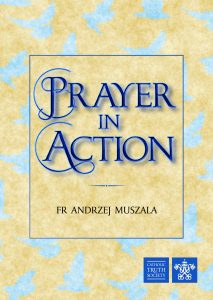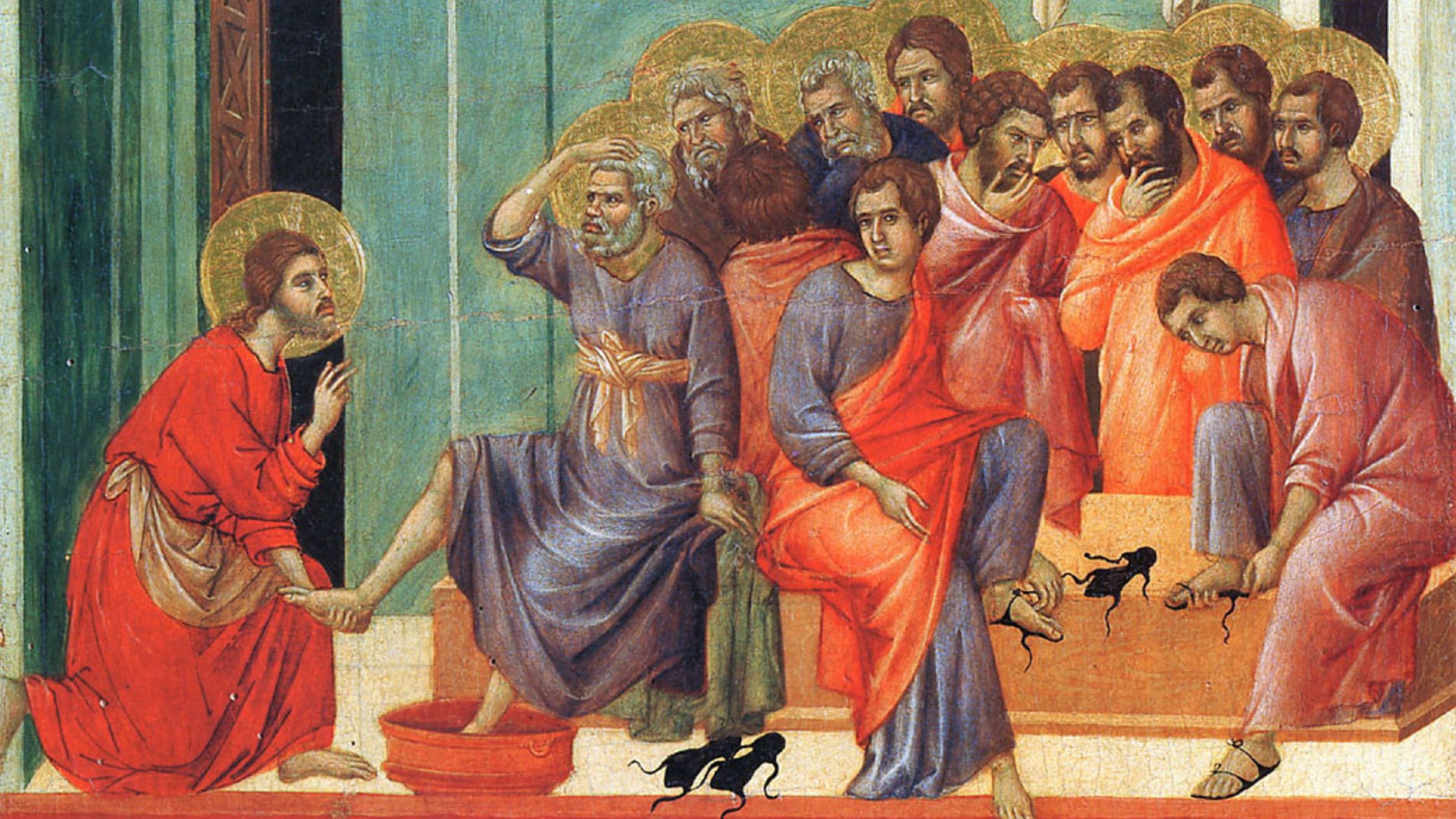My main task is now trying to forget about myself. One doesn’t lose anything by doing this as he finds Jesus in everybody and one can serve everybody more.
(Fr Marie-Eugène, letter to a friend, 6th May 1922)
There is a pattern to serving one another which was established by Jesus in the last days of his life when he did three particular things: washed his disciples’ feet, established the Eucharist, and died on the Cross.
When Jesus washed the disciples’ feet he said:
“Do you understand,” he said, “what I have done to you? You call me Master and Lord, and rightly; so I am. If I, then, the Lord and Master, have washed your feet, you should wash each other’s feet. I have given you an example so that you may copy what I have done to you. I tell you most solemnly, no servant is greater than his master, no messenger is greater than the man who sent him. Now that you know this, happiness will be yours if you behave accordingly.” (Jn 13:12-17)
In ancient times, a slave would have a bowl of water ready for when his master returned from the agora (the marketplace, or public assembly). As soon as his master arrived, the slave would remove his sandals and wash the dirt from his feet. Because it was the action of a slave, when Peter saw that Jesus was doing the same for the disciples, he shouted, “Never! You shall never wash my feet!” But Jesus said, “Do this to others as I have done it for you.” In other words, he was saying that we shall be blessed by doing simple things to show our love for one another.
Jesus was asking us to do simple, everyday things but to do them with great love. There are many examples of occasions when we can do this. At a simple level we can pass the bread at meal times, we can offer water to a hot and thirsty person and we can show friendship by accepting invitations to parties when we would prefer to be elsewhere. More significantly, there are opportunities to visit the sick – in hospital or at home, to visit prisoners, to give shelter to a refugee, to donate clothing to the poor and groceries to a food bank. We can also be alert to the needs of the community around us, especially to those who are distressed, hurt, lonely or bereaved. Such deeds of kindness are similar to the “widow’s mite” – a small contribution that may seem trivial in the eyes of the world but is priceless in the eyes of God.
There are patterns of behaviour that typify a prayerful person.
A kind and polite shopkeeper is helpful to customers in a shop. Instead of chatting to her colleague and, despite her tiredness, she helps the customer to choose, answering their queries with patience and courtesy. In so doing, within a couple of minutes, she has demonstrated multiple acts of love for others. She is not even aware she is doing something as beautiful and worthy as praying the Rosary. A student, living on the sixth floor, always seems to have a smile for her neighbours while standing together in the lift. She is good-natured and always has time for a few friendly words with them. Gradually more people notice her and they begin to wonder who this pleasant and polite student is who happens to live in their block of flats.
A mother of a disabled son takes him shopping, to church and out for walks. She is always watchful that he doesn’t hurt himself because of his lack of bodily co- ordination. She patiently explains things to him dozens of times, although some people would tell her it is pointless. She doesn’t give up but devotes herself to his care to the best of her ability. This is her personal example of constant prayer.
Patients look forward to the shift of the nurse who is kind and polite to them; a nurse who knows their names and is thorough in caring for them. This nurse speaks clearly, and loudly enough for them to hear and understand. The nurse who gets to know the personal situation of each patient brings a little sunshine and warmth into their grey world of suffering, and is a more effective carer than one who is indifferent to their individual needs.
A classroom teacher is on the lookout for those children who are disadvantaged, the ones from broken or dysfunctional homes and those who are bullied. This teacher takes care to prepare properly for classes and to ensure that all the pupils are able to understand the lessons. This teacher is devoted to the pupils and tries year upon year to do better for them and is delighted when they do well.
A politician shows respect for counterparts in the opposition party, avoiding offensive language or aggressive tactics. He listens carefully and earnestly tries to help the people he represents. He detests corruption of any kind.
Volunteer, priest, midwife, courier, taxi driver, waiter, nun, cook, accountant, architect, engineer, bishop…each of them can give their life to serve others. Step by step.
“We give priority over ourselves to those we really love” (T. Halik, I Want You to Be). Living life in this way makes sense of the notion of taking the Eucharist to others. Your days are turned into constant liturgy where you and angels sing, “Holy, Holy, Holy Lord”. You are giving yourself to others: just like Jesus did. “Take this bread and eat it; this is my body…Take this cup and drink from it; this is my blood…” The body symbolises the material things that we have been given so that we can be of service. In this way we are equipped to serve, just like the Samaritan who spared time for the wounded traveller and gave him two denarii and a donkey, or like Zacchaeus who gave away half of his possessions.
“Give, and there will be gifts for you; a full measure, pressed down, shaken together, and running over, will be poured into your lap; because the amount you measure out is the amount you will be given back” (Lk 6:38). The more you give the happier you are, and whatever you give will multiply. “Our body was given to us for us to give it away. Our body needs to be ‘given away’” (W. Stinissen, The Bread We Eat).
The ancient Israelites thought blood was the bearer of the soul. As blood circulates throughout the whole body it gives oxygen to all the cells and in a mysterious way transmits life itself. Therefore, giving blood was seen as endowing someone with spiritual values such as kindness, patience, hope, happiness, strength, faith and justice. All these values have their source in our soul and, nourished by the sacrament of the Holy Eucharist, we can be bread and wine for others, both in a practical and a spiritual manner.
“A person works not in order to feed himself but his relatives. We were created in order to serve others and not to serve and live for ourselves” (W. Stinissen, The Bread We Eat). The greatest act of love is to give one’s life for another. After washing his disciples’ feet and breaking the bread and drinking the wine, Jesus died on the cross. His last words were: “Father, into your hands I commit my spirit” (Lk 23:46). We are dying every minute. As we get older our bodies’ cells degenerate. People nowadays are desperately anxious to prevent this process; they spend fortunes on plastic surgery without achieving anything as a result. They are not aware that there is no greater love than to give your life for others. That is the biggest PARADOX of the Bible.
In order to gain EVERYTHING, we are required to give away everything. In order to gain happiness, we need to stop searching for it. In order to live our lives to the full, we must die.
Once we can come to understand this, and to see that, above all else, we want to give of ourselves so that others may have life, then we would not hesitate to donate a kidney, to jump into the water to help a drowning person or to carry on with a pregnancy despite there being a risk. We would begin to see that death is the greatest and final act of love and the ultimate fulfilment of happiness. After a while, we would be able to see that death is nothing to fear but we would be able to embrace death as our sister who will lead us to the Beloved.
Set me like a seal on your heart,
Like a seal on your arm.
For life is strong as Death,
Jealously relentless as Sheol.
The flash of it is a flash of fire,
a flame of the Lord himself.
Love no flood can quench,
No torrents drown. (Sg 8:6)
Your life will burn down like a candle at the altar. All will be done as you pray the priestly prayer of Christ in silence:
Father, glorify your Son so that your Son may glorify you; and, through the power over all mankind that you have given him, let him give eternal life to all those you have entrusted to him… I have made your name known to the men you took from the world to give me. They were yours and you gave them to me, and they have kept your word… I pray for them; I am not praying for the world but for those you have given me, because they belong to you…With me in them and you in me, may they be so completely one that the world will realise that it was you who sent me and that I have loved them as much as you loved me… I am not asking you to remove them from the world, but to protect them from the evil one. Consecrate them in the truth; your word is truth… And for their sake I consecrate myself so that they too may be consecrated in truth. (Jn 17)
 This blog is extracted from our book Prayer in Action by Fr Andrzej Muszala. Jesus told us that prayer should never cease, yet how is it possible to do this? Fr Andrzej Muszala explores how a true understanding of prayer in action allows our relationships to flourish and empowers us to actively live the Gospel.
This blog is extracted from our book Prayer in Action by Fr Andrzej Muszala. Jesus told us that prayer should never cease, yet how is it possible to do this? Fr Andrzej Muszala explores how a true understanding of prayer in action allows our relationships to flourish and empowers us to actively live the Gospel.
To learn more about how prayer can and should impact your everyday life, and to support the mission of CTS, order your copy of Prayer in Action today.
